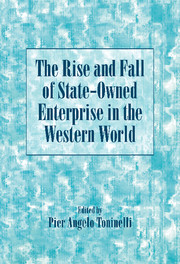Preface
Published online by Cambridge University Press: 05 December 2011
Summary
State-owned enterprises (SOEs) have long stirred up intense debates and political struggles throughout the world. In recent years, public sentiment and academic reasoning about the role of the state in the economy have fluctuated sharply During the 1980s and early 1990s, a major wave of disenchantment with state intervention swept through the industrial nations. In those years the fortunes of SOEs reached their nadir, and countries, such as Italy, that had previously resisted privatization started a massive dismantling of public undertakings. This movement resulted from the convergence of long-term forces and country-specific events, all of which are discussed in this book. The pro-market and anti-state climate of those years was reinforced by the sudden collapse of the socialist regimes of Eastern Europe and by the severe fiscal and monetary measures required of the members of the European Economic Community in order to meet the conditions of the Maastricht agreement.
In the second half of the 1990s, however, a new climate developed. In Eastern Europe the initial euphoria over the liberalization of the planned economies began to wane as the hard, grinding work of reconstruction continued. In Western Europe the recent success of center-left coalitions in France, Britain, Italy, and Germany brought the social price of economic change back into consideration. Judging from the Vienna Conference of December 1998, the emphasis now promises to be on growth, employment, and human capital formation rather than on fiscal and monetary issues.
- Type
- Chapter
- Information
- Publisher: Cambridge University PressPrint publication year: 2000

